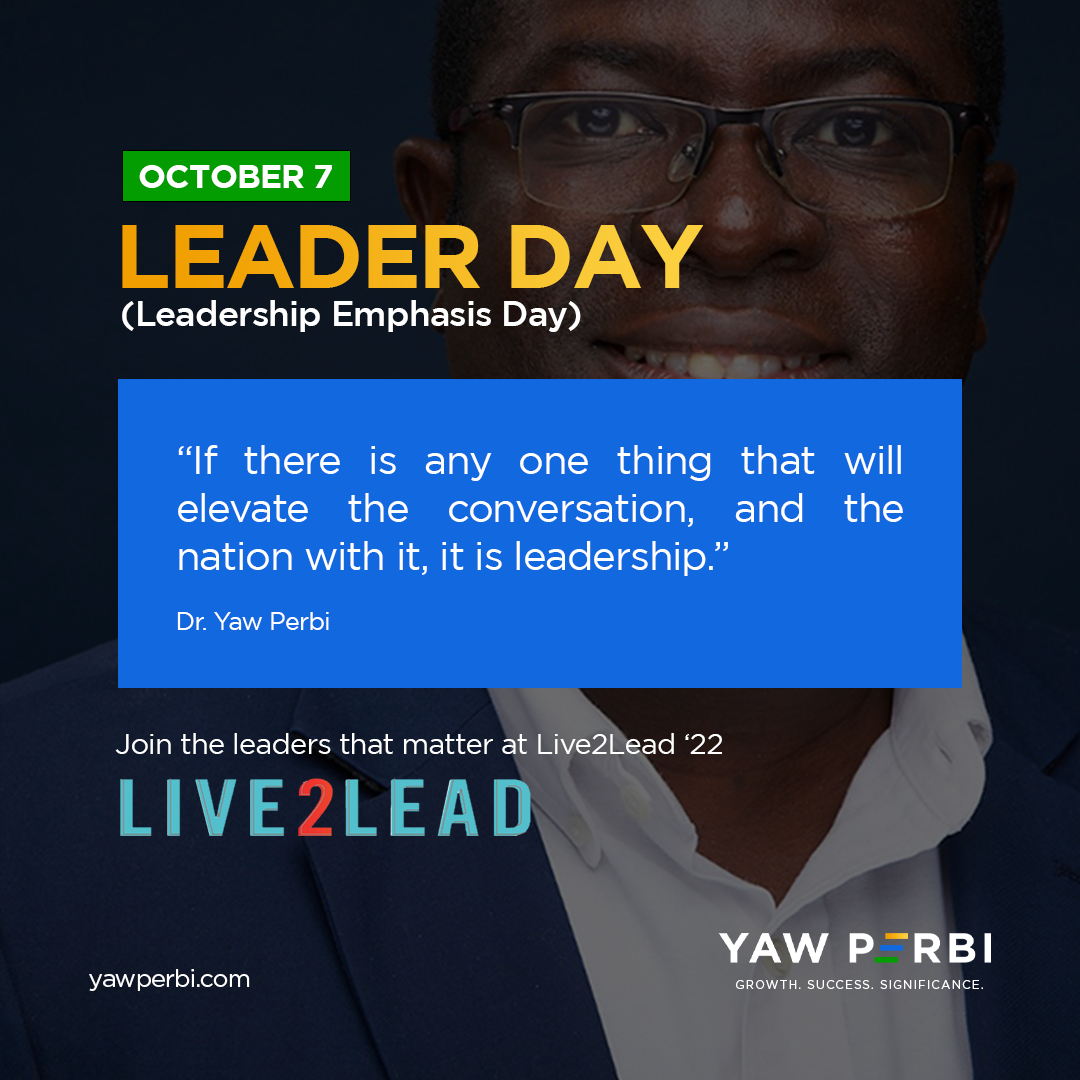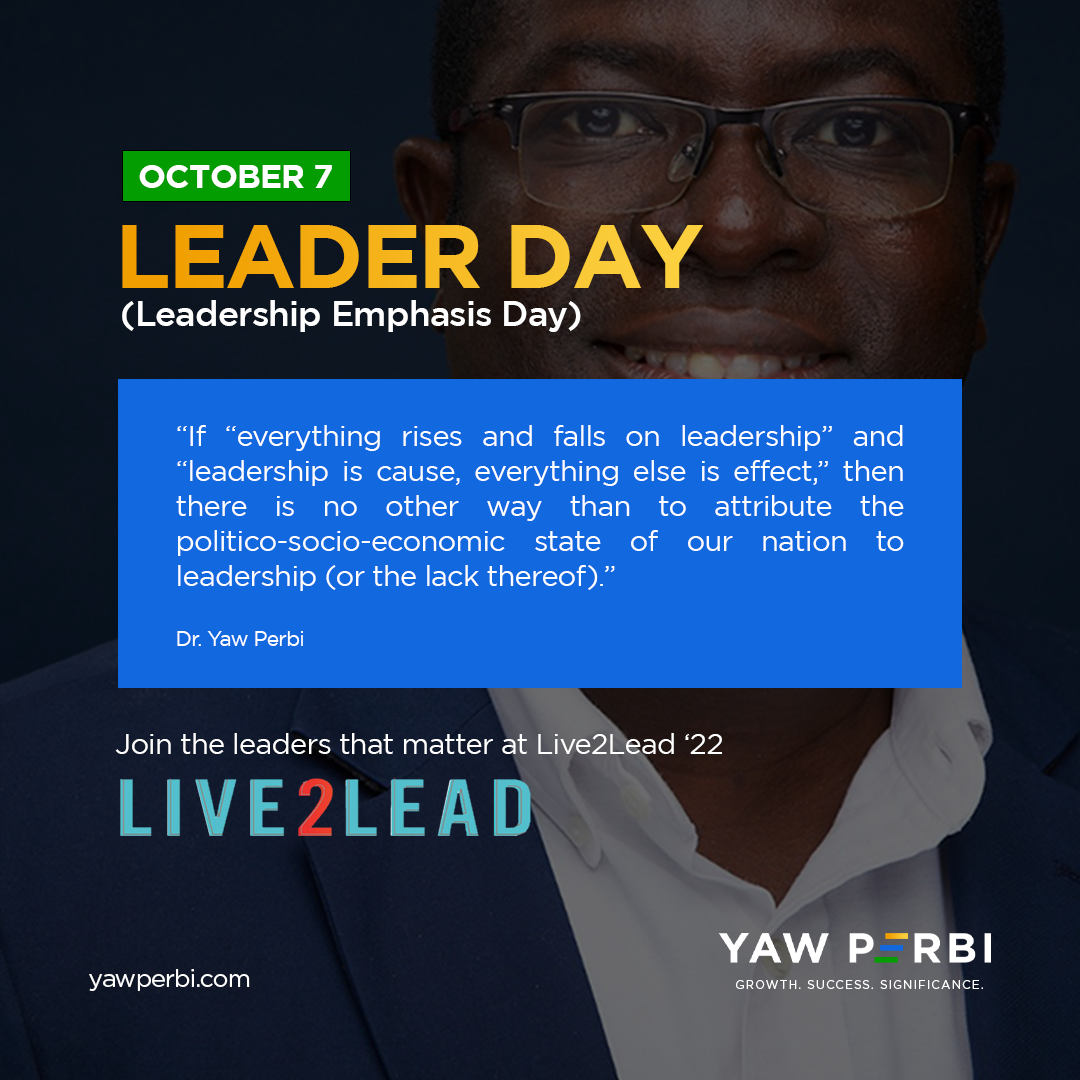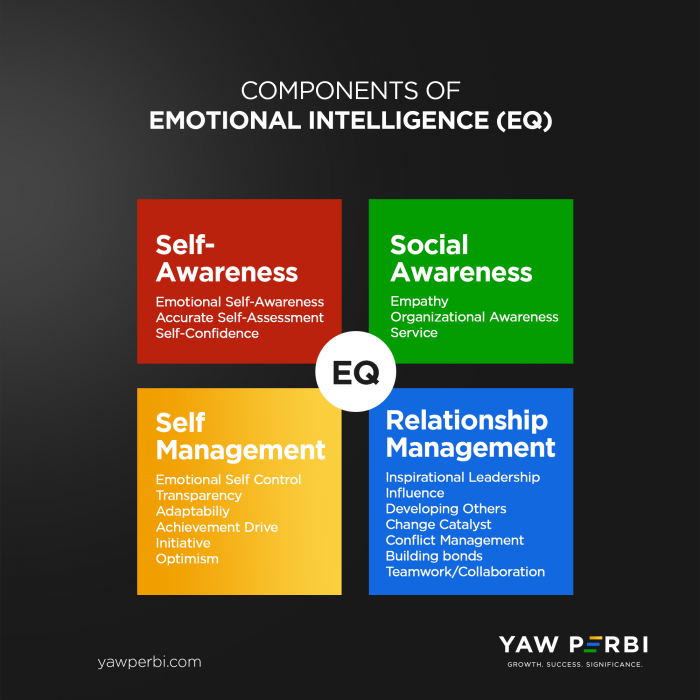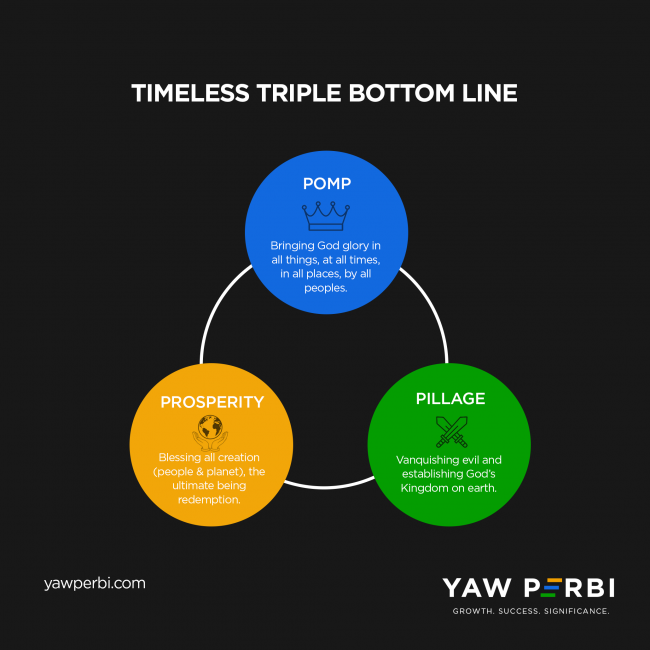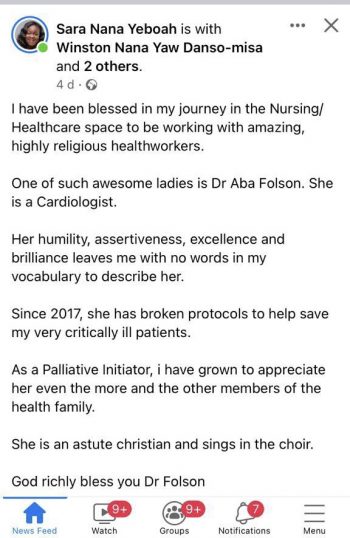
Meet Gwyneth Gyimah Addo, a Sight for Sore Eyes.
Gwyneth Gyimah Addo, often affectionately called Gwen, is a wife, mother, author, philanthropist, business leader, motivational speaker, marketing strategist and the CEO of Ghana’s leading human hair company, The Hair Senta.
After graduating from the University of Ghana, Gwen joined Standard Chartered Bank Ghana for six years. She holds an MBA in entrepreneurship and innovation from the China Europe International Business School (CEIBS) as well as an Executive Management qualification from Harvard Business School. Gwen was recently featured in a Forbes Africa interview on the global market boom of hair extensions and wigs. Her many awards include CEIBS Global Impact Award, CEIBS Most Promising Female Entrepreneur Award, and the 40 Under 40 Sales and Marketing Award.
Gwen founded the mega HIBS AFRICA global event to project the beauty industry on the continent and the Leading Senta Foundation which focuses on mentoring youth. Her first book, DIRECTION, is already creating impact in the lives of many young and adult readers. Her love, commitment, reliance and trust in the Lord is unquestionably the pivot around which her business success revolves.
WHAT YOU SEE IS WHAT YOU GET
It is hard not to like Gwen. She is absolutely winsome and authentic–what you see is what you get. This largely accounts for her over 100,000 following on Instagram, the social media platform on which she has virtually built her business. Finding high level leaders in Ghana who embody this year’s Live2Lead theme of “Leading with Integrity for the Common Good” has not been easy. Many crowd-pulling speakers did not seem to fit the bill, if we were going to be serious about walking the talk. It has been heartwarming to get to know Gwen personally, upon high recommendation from my network, and to find her a leader of integrity. The icing on the cake, for me, was to expressly read from her new book, DIRECTION, how integrity is a non-negotiable for her and the multi-million dollar business she heads.
On October 7 this year, Gwen will share her views on leadership and integrity and how she manages to remain authentic in a cut-throat society. Mrs. Gwyneth Gyimah Addo is a sight for sore eyes, literally and figuratively. Friends, we are going nowhere without integrity. For in the words of Zig Ziglar, “It is true that integrity alone won’t make you a leader, but without integrity you will never be one.”
Tune up your personal, professional and leadership game at this year’s Live2Lead conference. Register now through this link. Nag your organization until they join this rising movement of learning leaders that will transform society by becoming a Patron of Live2Lead. A Patron company or individual is one that sends at least 10 leaders to Live2Lead. There’s no way we can have at least 100 such Patron organizations and companies in Ghana and not transform it, one centre of excellence at a time. Together we can change our country and continent for the better! Let’s do this! Register here, NOW.

Meet Doris Kearns Goodwin, Presidential Historian Extraordinaire
Doris Helen Kearns Goodwin is an American biographer, historian, former sports journalist, and political commentator. In 1964 Kearns received a bachelor’s degree from Colby College, Waterville, Maine, and in 1968 she earned a doctorate in government from Harvard University, where she later taught government.
Goodwin won the 1995 Pulitzer Prize in history for her No Ordinary Time: Franklin and Eleanor Roosevelt: The Home Front in World War II (1994), and in 2005 she published Team of Rivals: The Political Genius of Abraham Lincoln, which focused on Lincoln’s management of his presidential cabinet. The book served as the primary source for Steven Spielberg’s biographical film Lincoln (2012). She later wrote The Bully Pulpit: Theodore Roosevelt, William Howard Taft, and the Golden Age of Journalism (2013) and Leadership in Turbulent Times (2018). In addition to her works of presidential scholarship, Goodwin wrote Wait till Next Year: A Memoir (1997), about growing up in the 1950s and her love for the Brooklyn Dodgers. She also served as a news analyst for NBC and as a consultant for Ken Burns’s documentary Baseball (1994).
TO LEARN OR NOT TO LEARN
It breaks my heart when I hear a famous statement like, “The only thing that we learn from history is that we learn nothing from history” (Georg Hegel, German philosopher). Yet of a truth, “Those who do not learn history are doomed to repeat it.” That quote is most likely writer and philosopher George Santayana’s, and its original form read, “Those who cannot remember the past are condemned to repeat it.” While leaders must not live the past, they certainly must leverage its lessons for today and tomorrow.
Consequently, in a fireside chat with John C. Maxwell at Live2Lead on October 7 this year, Doris will share key leadership insights gleaned from her decades of experience as a presidential historian, public speaker and Pulitzer-Prize winning author. The leadership lessons learned from some of the greatest leaders in our history provide timely clues on how to navigate the current condition of the leadership deficit we are experiencing today.
Come and up your personal, professional and leadership game at this year’s Live2Lead conference. Register now through this link. Nag your organization until they join this rising movement of learning leaders that will transform society by becoming a Patron of Live2Lead. A Patron company or individual is one that sends at least 10 leaders to Live2Lead. There’s no way we can have at least 100 such Patron organizations and companies in Ghana and not transform it, one centre of excellence at a time. Together we can change our country and continent for the better! Let’s do this! Register HERE, NOW.
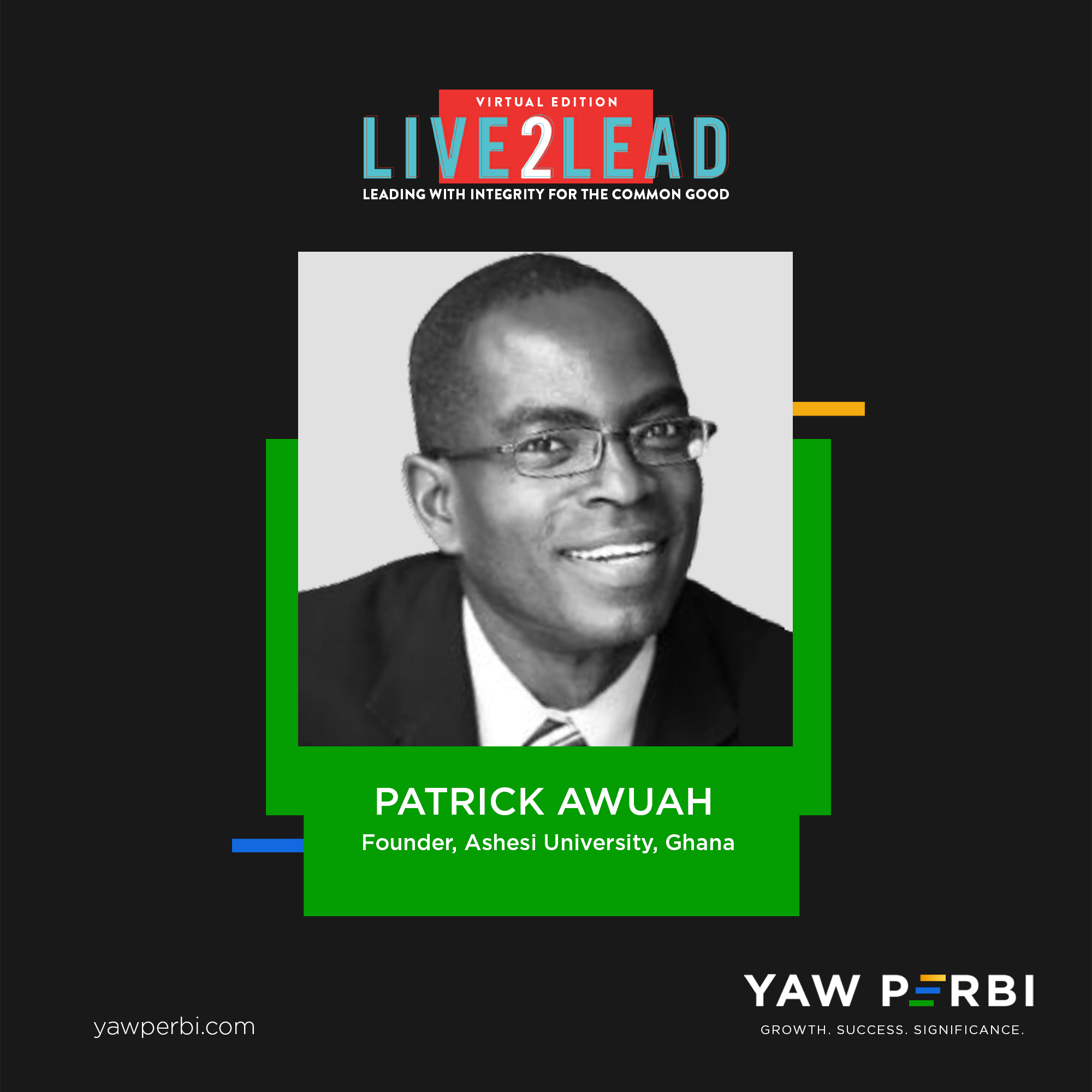
Meet Patrick Awuah, Trailblazer in International Education Brewed in an African Pot
Last Friday, I spent some time with friend, mentor and fellow African Leadership Initiative/Aspen Global Leadership Network Fellow, Patrick Awuah Jr. It was a joy to see and hear afresh his commitment to the cause of leadership development on the continent of Africa. And this personal pledge is to the extent that he will be excusing himself from a crucial Ashesi University board meeting to address the leaders virtually gathered at Live2Lead and then dive right back into the governance matters of this leading African establishment.
Patrick Awuah is a Ghanaian engineer, educator, and entrepreneur. Patrick founded Ashesi University in 2002. Dr. Awuah, with three honorary doctorates (Swarthmore College 2004, Babson College 2013, University of Waterloo 2018) to his name, has won numerous other awards as an individual and as the founder of Ashesi University. He was presented with the Order of the Volta Award to recognize his contribution to tertiary education in Ghana in 2007. In 2009, Awuah won the John P. McNulty Prize. In 2010, Awuah was awarded 87th most creative businessperson by Fast Company. In 2014, he received The Elise and Walter A. Haas International Award, which honours UC Berkeley alumni with distinguished records of service to their native country. In the same year, he was named best social entrepreneur by the Schwab Foundation for Social Entrepreneurship. In 2015, Awuah was listed by Fortune as number 40 in world’s 50 greatest leaders and was awarded a MacArthur Fellowship. In 2017, Awuah was awarded the World Innovation Summit for Education (WISE) prize, a major global education award.
INTEGRITY IN LEADERSHIP FOR THE COMMON GOOD
”INTEGRITY” is an often-used but little understood (and even less practiced) word in Ghana today. Patrick will be the keynote speaker on the theme for this year’s Live2Lead, “Leading with Integrity for the Common Good.” Ashesi has a fascinating story about an honour code and how its implementation nearly jeopardized Ashesi’s accreditation process. This tale has everything to do with instilling integrity, and for those of you who are not privy to the terrific tale, we shall be impressing upon Patrick to share “from the horse’s own mouth.”
Patrick will address what integrity actually means and share practical examples where he’s led with integrity and times his integrity has been challenged. Dr. Awuah will practically tip all and sundry on how integrity is taken off the wall and printed in hearts and minds on four levels: (1) personally (2) as teams (3) organisation-wide and (4) nationally.
You don’t want to miss Patrick Awuah’s fireside chat session at Live2Lead Ghana 2022. Grab your seat right here right now.
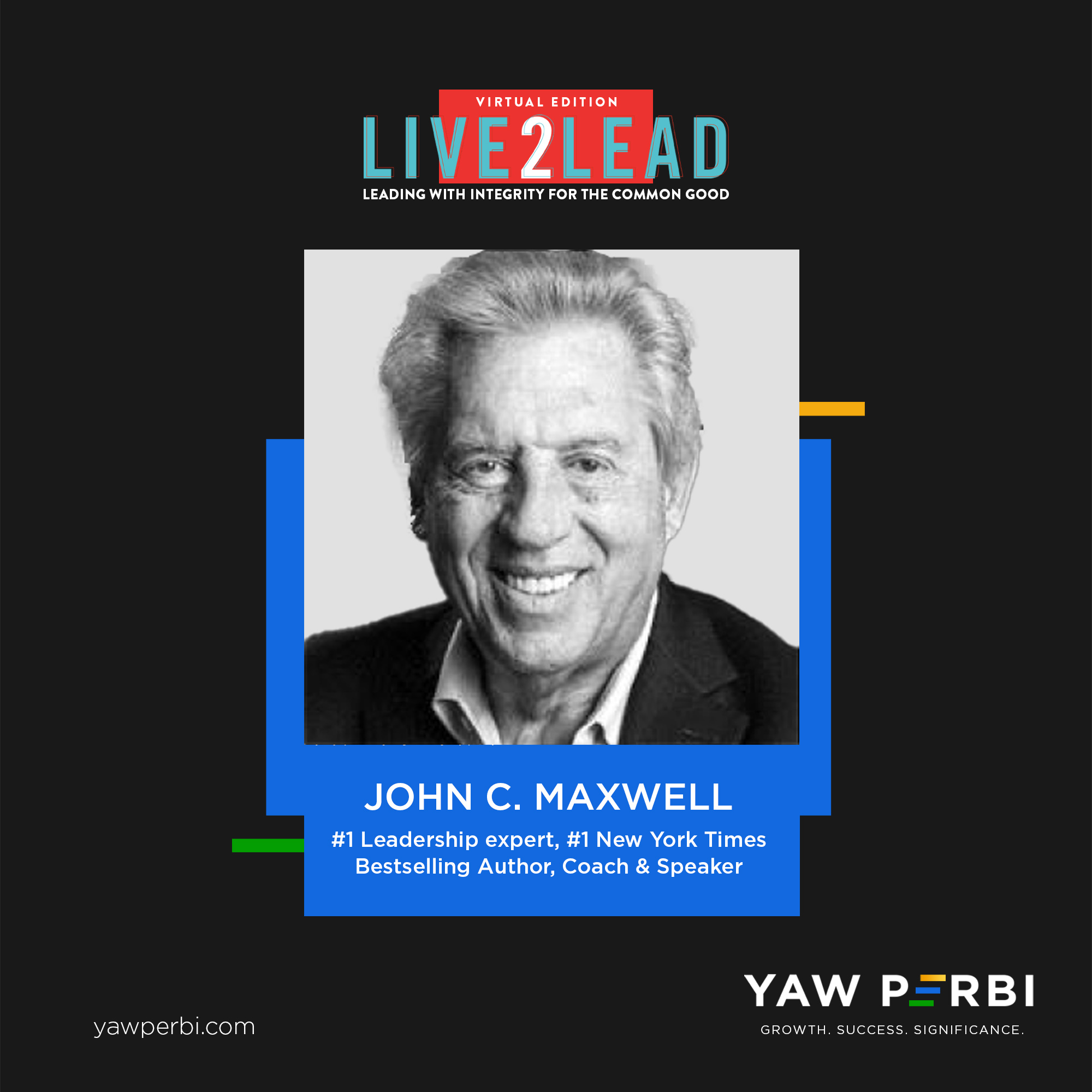
Meet John Maxwell, Mentor Emeritus
No single individual has influenced my leadership paradigm and praxis like Dr. John C. Maxwell. I started reading and understudying John in the late 1990s and have been teaching his materials ever since, both as a bonafide EQUIP trainer and a certified Maxwell coach/speaker/trainer on the John Maxwell Team (JMT).
Meet John Maxwell–my mentor emeritus–the #1 New York Times bestselling author, coach, and speaker who has sold more than 30 million books. John has been identified as the #1 leader in business by the American Management Association® and the world’s most influential leadership expert by Business Insider and Inc. magazines.
Dr. Maxwell has also received the Horatio Alger Award, as well as the Mother Teresa Prize for Global Peace and Leadership from the Luminary Leadership Network. His organizations—The John Maxwell Company, The John Maxwell Team, EQUIP, and the John Maxwell Leadership Foundation—have trained millions of leaders from every nation in the world.
The annual Live2Lead conference is John’s brainchild, and he always opens and closes, with other phenomenal faculty sandwiched in between. I have been privileged to host it on both sides of the Atlantic, in Montreal, Canada as well as Accra, Ghana.
LAWS OF COMMUNICATION AND LIMITS-BLOWING CONTENT
At Live2Lead this year, John C. Maxwell will be sharing new content from his upcoming book on the 16 Laws of Communication. Maxwell explains how to identify, grow, and apply your critical capacities. Once you’ve blow the “cap” of your capacities, you’ll find yourself more successful in your daily life.
We are absolutely convinced at YAW PERBI Executive Leadership Education that leadership (including communication) is taught; not just caught. Join John and the stellar faculty he’s put together for this year’s Live2Lead conference and up your leadership game. Register now through this link. Impress upon your organization to join the movement that will transform society by becoming a Patron of Live2Lead. A Patron company or individual is one that sends at least 10 leaders to Live2Lead. Together we can change our world for the better!
Register HERE, NOW.

Raise the Roof, Lift your Lid!
I just arrived at my room in Cape Town after three flights from Accra to Nairobi, Nairobi to Johannesburg and Jo’burg to Cape Town. A question on my mind as l flew here far above sea level, sometimes as high as 38,000 feet, has been, “How high is your leadership lid?”
THE FIRST OF THE IRREFUTABLE LAWS OF LEADERSHIP
Of course you know what a lid is, the cover of a container. How high your lid is determines the quality of the leadership that you provide for those you lead. I learnt this a long time ago, some 20-25 years ago from John Maxwell’s 21 Irrefutable Laws of Leadership. It was the very first of the principles of leadership he espoused in that bestseller and my life has never been the same since.
As John challenged me then from the written word—and many years later in-person—I must always endeavour to lift my leadership lid because no family, organization, church, community or country would ever grow past their leader. The leader is the lid over those (s)he leads. Sometimes when training leaders I ask, “are you a leader or ‘lidder’? because a leader is literally the lid on the progress and prosperity of their constituency. In a sense, every leader is a lidder; the question is “how high?”
IMAGINE THIS PRESIDENTIAL LID
You probably have heard me tell the story of a certain African president that a group of us, Maxwell certified leaders, were trying to connect in-person to John C. Maxwell for a national transformation process and programme. This president had never heard of John. In all probability, he hadn’t read any other contemporary leadership experts but hopefully he has digested at the very minimum some of the leadership classics like Plato’s, ‘The Republic’. It is a scary thought that this African nation—and by extension every family, organization, corporation, community, church etc. within her—would be constrained by the tightness of this head of state’s lid. I almost added, “through no fault of theirs,” but I guess they voted him into power.
HOW TO LIFT YOURS
While we educate a new generation that should be too enlightened to allow such tight lidders to lead African nations in the next decade, let me ask you, let’s get personal: how high is your lid? We forget, many of us (or we might even not know), that leadership is not just caught, it must be taught. And that’s why I love the opportunity, come October 07, for us all to be part of a life-altering, lid-lifting Live2Lead virtual experience with local faculty and global ones beaming all the way from Atlanta, Georgia.
We are gunning for 2,000 leaders—from emerging (youth) leaders, through leaders in the establishment (i.e. government/public sector leaders) to established leaders in the private sector, including executives from the corporate space. We will be taught in word and deed by powerful speakers and shakers like John C. Maxwell himself, two Patricks (Lencioni of the USA and Awuah of Ghana) and a Patricia (CEO of Vodafone, Ghana).
RAISE THE ROOF!
One of the most powerful discoveries in psychology over the last generation has been that people can learn and grow and change! So wherever your lid is today, if you learn to lead better you provide more room for those you lead. John will be the first to tell you that “your capacity determines your impact.”
Perhaps, some of the conflicts you are experiencing right now in your organization, church or wherever you lead is because your lid is too low and so people keep hitting it. And there is going to be continued tension and banging (conflict) till at some either you leave the stage or your people take their exit. As you have probably heard it said, people join organizations but they leave people (managers/leaders). It’s time to make room, lift your lid, raise the roof!
I have been part of things l left because the lid was too low. It just wasn’t life giving and l know people have also left my leadership when my lid was low because it was just too tight. Learn to lead. Each one of us can learn to lead better. Blow off the lid so that all of a sudden the people under your leadership feel this space and freedom because you lifted your lid and now they can breathe and create and innovate and… live again.
Join us at Live2Lead Ghana 2022, on October 7, and let’s all learn to lead better so that the people following our leadership can live better. If leading is your purpose on earth—that you live2lead—then you might as well as learn2lead, and do it well. As Donewell Insurance puts it, “If it must be done, it must be done well.” If we must lead, then we must lead well. Let’s blow off some lids and see our constituents blessed beyond measure, growing great and strong.
Right outside my hotel room window is the breathtaking view of the majestic, towering Table Mountain at 3,500 feet above sea level with no real ‘peak’ per se. No lid! So in the meantime, while you contemplate your lid, I will enjoy Cape Town on your behalf.
Post Script
Register and join LivetoLead here.
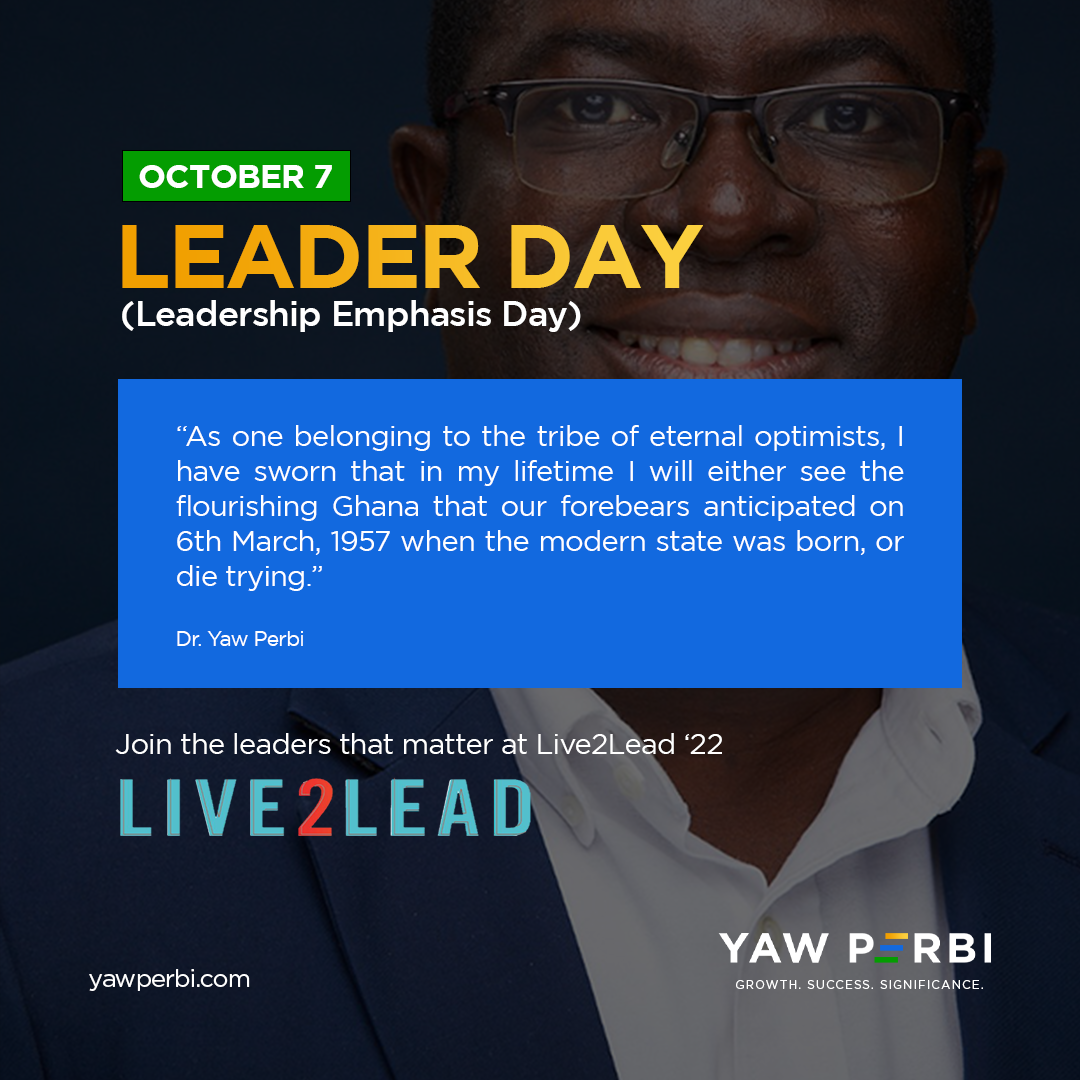
Leader Day, October Day
The world is not in a good place. Leadership is the cause. And when it comes to Ghana’s situation in particular, I have personally been shocked at the number of C-level leaders I have interacted with that have either completely lost hope in the future of the country or nearly have. “How did we get here???” one CEO of a major bank asked me via text (yes, with three question marks).
If “everything rises and falls on leadership” and “leadership is cause, everything else is effect,” then there is no other way than to attribute the politico-socio-economic state of our nation to leadership (or the lack thereof). In the same way, if there is any one thing that will elevate the conversation, and the nation with it, it is leadership.
DO OR DIE TRYING
As one belonging to the tribe of eternal optimists, I have sworn that in my lifetime I will either see the flourishing Ghana that our forebears anticipated on 6th March, 1957 when the modern state was born, or die trying. When the nascent nation was named ‘Ghana,’ our great grandparents were hopeful it would reflect the prosperity of the old Ghana empire, hence our new name (from Gold Coast). Oh, it bears repeating: our tribe of eternal optimists will see to a prosperous Ghana in our lifetime or die trying.
“I HAVE A DREAM, I HAVE A DREAM…”
Every true leader has a dream they passionately pursue with their people. I realize there is a day dedicated to almost every cause under the sun and pretty much each of the Sustainable Development Goals (SDGs)—women’s day, water day, literacy day, friendship day, founders day … even toilet day. Yet the one thing that causes each of these matters to rise or fall has no such day dedicated to it to elevate and emphasize it. Even then, is a day enough? Surely not; but it is a good catalyst for the remaining three hundred and sixty four (or five) days.
My fellow Maxwell-trained and certified collaborators in Ghana and I have a dream that ultimately the first Friday of October each year will become universally known as LEADER DAY. There is nothing special about the first Friday in October per se except that consistently for about a decade now, our mentor and leadership expert, John C. Maxwell, has been gathering some of the best leadership minds and hearts on the planet to speak to the issue, and we might as well leverage the opportunity rather than reinvent the wheel. Live2Lead is the name of that event. The name says it all, that’s our purpose on earth: We live to lead.
Gwen Addo, the pulchritudinous CEO of the Hair Centre and speaker at Live2Lead Ghana ‘22 affirms this vision: “I also pray your dream comes true and October 7 becomes a “leadership day” or perhaps October becomes a “leadership month.”” She continues, “leadership is close to my heart … and why not dream it bigger than just a day.”
You and I know the dearth of leadership in our country. We, Maxwell certified trainers who are Ghanaian, are aiming to get 2,000 leaders at all levels to benefit from the LIVE simulcast from Atlanta. We will organize local content for our context first, sandwiching the global feed. You would want to be with Patrick Awuah (Founder & CEO, Ashesi University), Patricia Obo-Nai (CEO, Vodafone), Uncle Ebo Whyte (CEO, Roverman Productions), Gwen Gyimah Addo (CEO, The Hair Senta), Kathleen Addo (Chairperson, National Council for Civic Education) and Kwamina Asomaning (CEO, Stanbic Bank). The core issue on the table this time, or shall I say by the fireside, is “Leading with Integrity & Inspiring Hope, for the Common Good.”
STRATEGY
On October 7, we shall convene 2,000 Ghanaian leaders online. At least half of them will be from 100 companies, institutions and organizations which would send 10 of their leaders to Live2Lead as their investment in themselves as well as boldly staking their claim in the prosperity of Ghana by raising the leadership lid in the country, one company at a time. All these companies will be listed as patrons in the event handbook, website and social media (in alphabetical order).
The other half will be made up of executive leaders from the private sector, the establishment leaders (public service) and emerging leaders from our schools and universities, representing the next generation. Companies, institutions and organizations which want to go beyond patron status will be given opportunity to sponsor the establishment and emerging leaders in exchange for significant air time and eyeballs.
This 2,000 is only for starters; we shall double in 2023; and double again and again till at least 2% of all leaders in Ghana are connected to this Live2Lead tribe of learners who lead and leaders who learn. That is the exact critical mass needed to see a self-propagating movement of leaders worth following in Ghana: 2% of the leader population.
CONCLUSION
The feedback from the ground as I have gone around is damning. Ruinous to the extent that although the theme we initially chose for our local content is ‘Leading with Integrity for the Common Good,’ we’ve had to come up with a conjoint theme of HOPE. Our people need hope. Leaders are brokers of hope, thus when they themselves are broken to the extent that they have no hope, what shall the rest of the people do?
Arise Ghanaian leaders!, established and emerging ones alike. We are better than this. Yet perhaps we are expecting leadership behaviours, values and attitudes that we haven’t first trained into people. Since we Live 2 Lead (that’s our purpose) let’s then Live 2 Learn (that’s the process) so we can all lead better and all make our nation great and strong. When the leader gets better, everyone and everything else does too. So let’s all show up!
One day in October, for starters. Just one day but who knows? Perhaps ‘October Day’ will in my grandchildren’s day be as well-known as ‘May Day’ is today. And for even better reasons, leadership-wise.
PS.
An event is not enough for sustained transformation thus there are leadership development and training pathways that will later be shared as a follow-up process between October 7 and the next Leader Day a year hence.
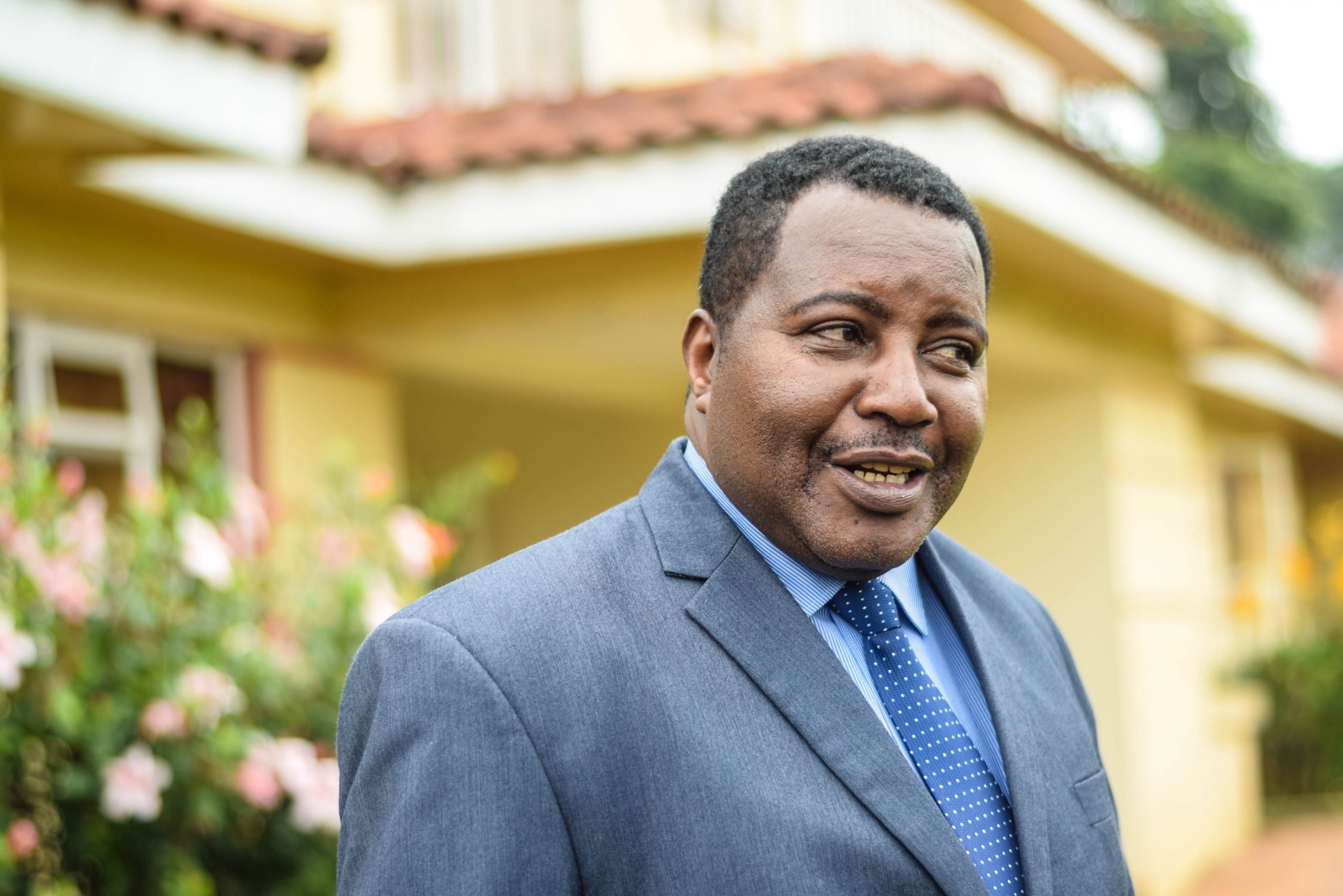
Do The People You Lead TRUST and RESPECT You? Time To Find Out!
Trust is the foundation of all leadership. Earning the trust and respect of the people you lead may take years but can be lost overnight.
Sometimes people endure the pain and discomfort of a leader because they need the salary and have nowhere else to go. Or they may choose to respect your position but distrust you as a person. That’s sad. That is particularly sad because pure leadership emanates from the personal power of the person of a leader, not their positional power.
It’s even sadder to go about your daily tasks as a leader without an awareness of what the people you lead think and feel about you. That’s because a time of crisis will strike one day and you’ll behold, for the first time, the true colours of the people who have been smiling and bowing before you in the corridors of your organization.
In times of crisis, leaders who are not trusted and respected are left to hang. The led leave without notice and never look back. Unfortunately, some leaders still fail to read the signs and instead blame everything and everyone else except themselves.
What kind of legacy do you want to build as a leader? Do trust and respect matter to you and are you intentional about building them?
Here are five reasons why trust and respect are important:
- When followers trust you, they’re more likely to do what you ask and even go the extra mile to help you succeed.
- When followers trust you, they’ll freely share ideas, feedback and solutions that will help the organization achieve its goals.
- When followers trust and respect you, they’ll consult you anytime even after they stop working for you.
- When followers trust you, they’ll recommend you to other people.
- When followers trust you, they’ll warn you when you’re in danger and stick by you even in times of crisis.
At YAW PERBI we conduct Trust, Respect & Reputation Surveys for organizations. This concise, confidential and customized survey will give you a clear picture of what your staff think about you as a leader, your board and managers.
This is what Kenneth Magembe, the Managing Director of Armstrong Consulting Engineers, said after conducting this survey in his company, “Never take things for granted. Small things easily affect the trust of my staff. Integrity and fulfilling promises are key drivers for improving employees’ trust.”
The survey will measure your;
- Fairness when dealing with staff
- Response to staff’s ideas, suggestions and requests
- Listening skills
- Display of integrity in your character, conduct and conversations
- Delivery of promises
- Confidentially of staff’s personal information
- Staff’s confidence in your qualifications, skills and experience
- Staff’s sense of loyalty to you
- Concern for the well-being of your staff
- Modelling of company’s core values
Once the staff has completed the survey, we’ll deliver a comprehensive report of the results, interpret them and provide concrete and practical suggestions for building, reinforcing or restoring trust, respect and great reputation in your leadership in the organization.
You’ll also get a free one-hour coaching session with one of our certified professional coaches to set smart goals in this important aspect of your leadership.
To access this survey contact us at info@yawperbi.com.
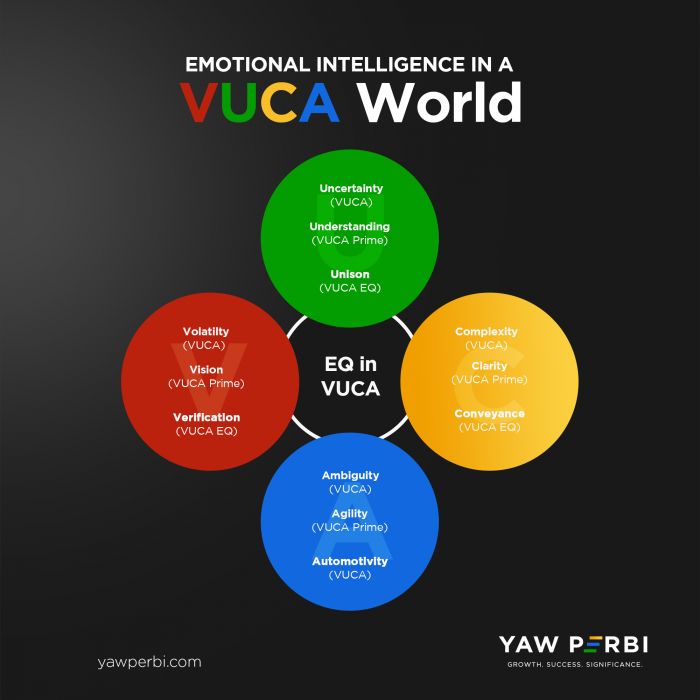
SO YOU THINK YOU CAN LEAD WITHOUT EQ IN A VUCA WORLD?
As one of the Pan African Cohort facilitators of BCA Leadership, I just got off a scintillating Zoom call with amazing African C-level leaders from across the continent—East Africa (like Kenya and Uganda), West Africa (I recall Nigeria, Sierra Leone and Ghana), North Africa (Egypt) and Southern Africa (Malawi, South Africa). We talked about Emotional Intelligence and the whole idea of VUCA. The goal of this blog is to summarize the essentials of the topic, which most participants described as ‘intriguing’: “So you think you can lead effectively without EQ in a VUCA world?” Really, this is a rhetorical question because no one in their right senses would say, “Yes, I can lead effectively without Emotional Intelligence (EQ)” in the first place, let alone in a world that’s described as VUCA.
WHAT ON EARTH IS VUCA?
VUCA is a term that came from the military space, especially at the end of the cold world war when without the two clear polarizing forces the whole world was described as Volatile, Uncertain, Complex, and Ambiguous. Guess what? If the end of the last century was said to be VUCA then imagine just how much more VUCA it is now. Look at the volatility of the world today, look at the speed of transformation, the dizzying digital economy. Consider the uncertainty with COVID-19 and this post-pandemic world. Is it even a post-pandemic or rather para-pandemic world as in some places it seems over and in others, COVID is still raging? Look at the complexity of the world. How could a microscopic virus emerge in a small place in some corner of the world called Wuhan, China, and the whole world gets grabbed into this? Some things are just ambiguous right now. It’s a VUCA world. There wouldn’t be enough space to write out all the feelings these VUCA times have generated in people, especially anxiety.
HOW ABOUT EQ?
Even before the VUCAness of the world, Emotional Intelligence had been identified as the key thing for succeeding in leadership. It is archaic 20th century thinking that IQ (intelligence quotient) makes a good leader for a total leader not only has IQ, in terms of book smarts or cognitive intelligence, but also Emotional Intelligence (EI/EQ) in terms of being intelligent about feelings and Global Intelligence (GQ). Humans like to think we are rational people but at the end of the day we are emotional beings. The term was first coined in 1990 by researchers John Mayer and Peter Salovey, but was later popularized by psychologist Daniel Goleman five years later.
We now know that 80-90% of success in Executive Leadership depends on Emotional Intelligence and not cognitive intelligence. Don’t get me wrong, I am not dumb. I am a medical doctor for crying out loud. Intelligence is important but guess what? When it comes to Executive Leadership, IQ only gets you into the door, it takes EQ to play the game. And win. After about 128, IQ doesn’t matter anymore! Given the same level of IQ, technical skills, and competence, it’s EQ that would make all the difference in how much one succeeds (or not).
Emotional intelligence, according to Psychology Today, is “the ability to identify and manage one’s own emotions, as well as the emotions of others.” It is thus made up of the following four blocks:
BUT THERE’S PROBLEM
So being the amazing leaders we are, we figured out we cannot just sit idly twiddling our thumbs and watch VUCA happen without responding. In 2007, one Robert Johansen (a distinguished fellow at the Institute for the Future), came up with a behavioral leadership model he called VUCA Prime to counteract each of the four elements of VUCA with a specific positive response which starts with the same four letters. VUCA Prime then is to have Vision over Volatility, to overcome Uncertainty let’s have Understanding, then Clarity over Complexity and to overcome Ambiguity let there be Agility.
Well, I have been studying this since the pandemic began and was thinking recently how good VUCA Prime is but how so very cognitive it is! Why is VUCA Prime so cognitive and does not take enough emotions into cognizance especially when we know 90% of success will depend on a leader’s emotional awareness (of self and others) and responses?
WHAT IS VUCA EQ THEN?
Consequently, I have designed something called VUCA EQ to provide a more comprehensive and potent leadership response to VUCA beyond the cognitive, one that significantly takes emotional intelligence into consideration. Like VUCA Prime, each of the VUCA EQ responses also begins with the same four letters.
Firstly, V is Verification: we need to be able to decipher what our emotions are and label them correctly. Then we need to be able to do the same for others as well so we can respond rather than just react, and we can manage our emotions and that of others instead of just trying to control them. The world of command and control is gone!
Secondly, instead of Uncertainty and just responding with the cognitive Understanding that VUCA Prime proposes, we rather respond in Unison. What I mean by Unison is to respond with our three brains. You have the cognitive brain but you also have your emotional brain called the limbic system. EQ is not just a ‘heart’ kind of thing, no! Emotional Intelligence has to do with the brain too. Or even more annoying, called ‘soft skills.’ EQ produces hard results on the balance sheet and cashflow statements! There is the Cognitive brain, Emotional brain, and Instinctive brain and VUCA EQ is about responding with all three in unison.
For Complexity, not only overcome with clarity but with Conveyance. Powerfully transmit emotional then logical information and carry across values and perspectives, considering emotional data and communicating emotions first. Remember to start with emotional data when decision-making and communicating eg. I feel vexxed about this decision and I’m aware most people in the company feel anxious…. Connect with emotions and convey them in response to complexity.
Then finally, for Ambiguity, not only thrive with agility but by Automotivity. In other words, learn to move people’s emotions or move people emotionally. Automotivity means containing within itself the means of propulsion or movement. Mobilize people in such consonance and resonance with what they want (motives) and how they want (motivations) that they move in a self-propelling manner. After all, why do you suppose feelings are called e-motions? Feelings move us, they move the world. We may not like to acknowledge it but they do. How do you learn to know people’s motives and their motivations so that you can ride on that to send them (better still, travel with them) to a place where they ought to go?
CONCLUSION
Leadership is in the transportation business. We move people from here to there and without the power of Emotional Intelligence to move people (think e-motions) towards a shared, noble purpose, we are going nowhere ourselves in the first place and taking no one with us for that matter. Don’t you ever think you can successfully lead, especially in this VUCA world, without Emotional Intelligence.

Are You Aligned with the Mission of God in the Marketplace?
Marketplace leaders of faith, it’s time to align. Since returning to Ghana, after several years mainly in Canada, that is a word I’ve heard a lot in my re-orientation: align. “Let’s align, let’s align,” I hear this quite often! CEOs want to align with their boards, other C-level executives need to align with their various teams, sales and marketing must be congruent, and everyone needs to align with the company’s vision, mission and values. All well and good.
Let’s elevate this alignment conversation as I dedicate this particular blog to marketplace leaders who are Christ-followers. The Christ-following marketplace leader does not, and indeed cannot, have the same motives and bottom line as someone who isn’t a Christ-follower. This week, I had the opportunity to speak to a group of emerging leaders on “Man with a Vision on a Mission,” which was essentially about the purpose of life. Dr. Myles Munroe of blessed memory once put it so poignantly, “The greatest tragedy in life is not death, but a life without a purpose.” Purpose is when you know and understand what you were born to be and accomplish, what something was made for. Or as they say in the French city of Montreal my family and I have been domiciled in for over a decade, raison d’être (reason for being). I’ve also held discussions with some of the C-level executives in the Ghana Club 100 from mining to fintech about purpose. (Ghana has christened the top 100 companies as the Ghana Club 100, akin to the Fortune 500 in the United States). These premium companies have profit, for sure, but how about purpose?
WHY WE ‘GO TO MARKET’
We are in business for profit, that’s the bottomline—or so we thought until a couple of decades ago, the concept of ‘Triple Bottom Line’ arose (thank you John Elkington) as a result of people pursuing profit at the expense of human well-being and the sustainability of our earth. The bottomline has since been triadized as Profit, People, and the Planet. That’s the triple bottomline. All three come together for holistic prosperity and complete sustainability.
Profit, is about acing financial performance, generating dollars for shareholders. By People we mean a focus on a business’s societal impact, or its commitment to human beings—within and without the company or organization. People are the other stakeholders beyond the shareholders (who are taken care of largely by profit). We mean people impacted by business decisions from customers and employees to community members. With all the talk about climate change and the like, companies are now tasked to also aim at making a positive impact on the Planet as they seek to capitalize on it to make profit.
Yet while all three are important to everyone in the market—of all faiths, little faith or no faith—I refer to the above treble as the temporal bottom line. There is a timeless triple bottom line, which is what I want to draw the attention of marketplace leaders of faith to.
MISSION IN THE MARKET
I’ve realized that we need a reorientation of why we’re in the marketplace, and what our mission is, as Christ-followers. I often tell people that if they don’t have a personal purpose statement, they wouldn’t know which company to work with or for because they won’t know if they are aligned. Your values must be compatible with theirs. Similarly, if you are a Christ-follower, your mission in the marketplace must be aligned with God’s mission.
What exactly is God’s mission? That’s the timeless triple bottom line I refer to. God is on a three-fold mission in the world:
1. Towards Himself—to bring glory to Himself. God gets glory when we reflect His good nature in our being and doing. He desires, and deserves, to receive glory also from the obedience, service and worship of all nations and peoples in every sphere of life, from Archaeology to Zoology. Are your life, leadership and work God-glorifying?
2. Towards creation—to bring a blessing to all created things. God is on a mission to bless all of creation, not just people. People, first and foremost, but all of creation is a candidate for God’s blessing. While the blessing would include the temporal financial profit, people’s prosperity and the planet’s care (triple bottom line), the greatest of blessing is all creation being freed from the penalty, power and presence of sin to be God’s friend once more, to worship and serve Him and reflect His nature lost once-upon-an-Eden again. So, the second-fold mission of God in blessing creation comes through in the 3BL of business, but there is a redemptive element that I dare to say is the most important. I say this because that will outlast how long profit, this planet and this life will endure. Are your life, leadership and work creation-blessing?
3. Against evil—to vanquish evil and establish His Kingdom on earth. Yes, your mission as part of God’s grand mission is to pillage evil to establish God’s righteous, just, and equitable Kingdom on earth forever and ever, as it is in heaven. Are your life, leadership and work evil-crushing and Kingdom-establishing?
PRAYER AT WORK
We see the above three-fold mission of God in the prayer Jesus taught his disciples:
1. Glory to Himself—“Our father in Heaven, Hallowed be your name… For yours is the kingdom, the power and the glory forever and ever, amen.”
2. Blessing to Creation—“Give us today our daily bread. And forgive us our debts (sins), as we also have forgiven our debtors.”
3. Against Evil—“Your kingdom come, your will be done on earth as it is in heaven… And lead us not into temptation, but deliver us from the evil one…”
Organizing prayer at work with like-minded, same-hearted folk of faith is good but being the answer to the prayer is even better—makes it complete.
BOTTOMLINE
Consider this! As a person, am I aligned with God’s mission? Is this what my life, leadership and work are all about: bringing God glory, blessing creation, defeating evil and establishing God’s kingdom? Is that what my company stands for?
So being an effective agent of God in the marketplace is going for the timeless triple bottom line for God’s glory, for blessing people and the planet in general, but especially the blessing of redemption, and ultimately defeating evil to establish God’s kingdom on earth as it is in heaven, starting with your workplace. This is the tried-and-true-and-timeless triple bottom line. Is your work and leadership redemptive?
We must all align ourselves with God’s mission because to be with God on his mission is the greatest cause of all time for all people on Earth in any and every era. Oh, that it would be done in our marketplaces as it is in heaven!

Relax. Religion isn’t going anywhere.

Although Pew’s projection of the Christian numbers is disputed by many, like the Center for the Study of Global Christianity (that it should be much higher)), the point being made in this article is still clear: the majority of the world has and will continue to be religious.
I’m very excited to begin my doctorate in global leadership this week. Having been a student of leadership for the last 25 years plus and acquired a Master’s degree in it a few years ago, I’ve felt it’s time to do the whole nine yards, not so much for the title (after all I’m already a doctor) but to go deeper and be even better-seasoned in my darling subject (or is it object?).
In going this doctorate route, I opted for a seminary environment because faith matters immensely to me, and indeed to the majority people in the world. The increased secularization of a formerly mainly ‘Christian’ Europe and certain sections of American society seems like an overwhelming flood to many only because it is a sharp deviation from the not-so-distant past when there was hardly any division between church and state; but also because the West disproportionately fills the media space. Only last week the German national broadcaster shared that a recent poll showed “most Germans find religion unimportant.” Yet the fact remains that the majority of the world has and practices a faith of sorts. In 2025, 90% of the world will be religious, my friends who run Operation World say; and by 2050, at least 87% of the world will still be religious, according to Pew Research.
The mid-twentieth-century secularization theory—that an increase in modernity means a decrease in religion— has been largely debunked by the likes of Berger (2014). According to Todd Johnson, who I just exchanged emails with, an astute associate professor of Global Christianity and Co-Director of the Center for the Study of Global Christianity at Gordon-Conwell Theological Seminary, “Despite increased modernity the world has in fact become more religious; 80.8% of the global population self-identified with a religion in 1970, rising to 88.1% in 2010 and with a projected increase to 91.5% by 2050,” higher than Pew’s projected 87% cited in the previous paragraph! Even the ‘unaffiliated’ doesn’t mean they aren’t religious; it often means they choose not to be identified with any ‘institutionalized’ religion. Just as humans have a physical, social and mental components that cannot be denied, so is there a spiritual capacity that we cannot run away from. French mathematician and philosopher Blaise Pascal put it succinctly, “There is a God-shaped vacuum in the heart of each man which cannot be satisfied by any created thing but only by God the Creator,” and in his experience and exposure, “by God the creator made know through Jesus Christ.”
By the way, I use the world ‘religion’ generally (and maybe even generously) because as an insider of the Christian faith I wouldn’t call Christianity a religion per se. Religion connotes man in search of God while in the Christian faith it is actually God in search of man. Not only that, religion tends to paint a picture of rigorous rules and rituals while true Christianity is more of a relationship with the Divine than a set of rituals or rules per se. That being said, for the purpose of this article faith, spirituality, divine relationship and religion are all being treated as ‘religion.’
FAITH AND WORK, FAITH @ WORK
Without God, and my faith in Him, I do not have a reason for being, a raison d’être. Neither do I have sustainable passion for my doings because all of it feels like, in the words of the wisest and wealthiest monarch ever, “vanity of vanity, it’s all vanity.” I have observed with grave concern the increasing divorce of faith from the work space, treating it like the plague or some highly contagious disease. Even on work-centric social media like LinkedIn, one cannot help but get the feeling that the mention of God in posts ‘spoils the atmosphere,’ which is riddled with human achievements, of brain and brawn (mainly the former), simply singing of how great we are.
But statistically, 90% and over of the people on LinkedIn are religious. There are myriads like me who know we wouldn’t be as excellent professionally but for our faith. Meanwhile, all who have an active religious affiliation yet act at work as if they have no faith are walking on the dangerous ground of inauthenticity. It is not integrous to want to, or have to, hide such an important part of one’s life as spirituality or faith in a space that easily takes up a third to half of our waking hours: work!
This week, a Muslim mate of mine from medical school, now a neurosurgeon, posted on our year group’s WhatsApp platform a screenshot of a heartfelt social media post someone had made about Dr. Aba Folson, one of our Christian colleagues who is now a cardiologist. This person who made the post, a nurse, starts by saying, “I have been blessed in my journey in the Nursing/Healthcare space to be working with amazing, highly religious health workers. One of such awesome ladies is Dr Aba Folson. She is a Cardiologist.”
She goes on to describe “her humility, assertiveness, excellence and brilliance” and how Aba has “broken protocols to help save my very critically ill patients.” The protocols she speaks of, I believe, were put in place to save patients in the first place, but there are situations where one has to do the unusual and even unconventional at great risk, which separates humans from machines and even artificial intelligence. The wisdom and courage to make such calls, Dr. Folson will say, I know for sure, comes from above. The writer of the text seems to be enamoured by the fact that Aba is “an astute Christian and sings in the choir.”
ALL WE NEED IS RESPECT
I still remember zooming down the corridor between the ER and the blood bank to fetch blood for a critically ill child. This was during my days as a medical officer at the 37 Military Hospital in Accra. We usually had junior staff who would do that but no, this young doctor run in his white coat. The child’s mother gathered the energy to attempt to run alongside me. Barely catching up and hardly catching her breath she managed to say these words, which I shall never forget, “Doctor, doctor I can tell you are a Christian.” She must’ve known that for a Christ-follower the Pauline admonition about work is clear and strong: “Whatever you do, work at it with all your heart, as working for the Lord, not for human masters.”
What is needed, indeed all that is needed, is for respectful co-existence in a pluralistic workplace, which is a microcosm of a really pluralistic world. The fight for diversity and inclusion in the workplace must not, and indeed cannot, be limited to ethnicity, age, gender, (dis)ability and such alone but faith as well. The majority of us wouldn’t be present at work with purpose and perform with passion and excellence without it, and none of us will be authentic in the workplace pretending we didn’t have it.
Faith works. Let your religion work at work—faith, love and hope at work. Your faith should make you a better professional; not worse. If your faith doesn’t make you better at work—which is all about service to humankind made in the image and likeness of God—it’s not worth following. Change it. Let’s see faith at work working, doing good works that bring God glory and bring about the good society—that’s the way it ought to be.
Post Script.
Right after I posted this blog, I came across a photo and headline on LinkedIn that said, “South African doctor: Professor “Mashudu Tshifularo” just became the first surgeon on earth to successfully perform surgery [with 3D technology] to cure deafness. He is also a pastor.” Ahem. Point nailed!

